Golden Lane at Prague Castle
Golden Lane was home to the “little people” i.e. servants, smiths and soldiers and one Franz Kafka for a while (only visiting). It’s a neat little cobble stoned street with houses on one side built into the wall. Quaint windows, antique furnishings, restored interiors and earth colours make it an interesting place to visit. I’d allow 30 minutes here.
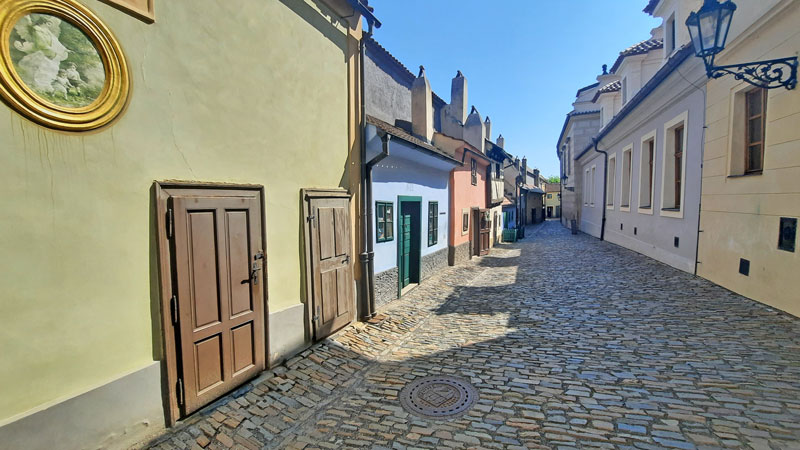
Exploration Warning
These are very small houses. You must pay attention when entering and exiting that you don’t hit your head on the door frame and when inside the houses look out for the glass partition walls that you may head-butt by mistake.
Tour Tips: To access Golden Lane you need the historic buildings ticket. the four tours below allow you to skip the ticket queue. Two are for self-guiders and the other two are for people who want to join a guided tour.
Origins of Golden Lane
Following the construction of the northern wall of the Castle that connected the Dalibor and Black Towers, the northern bailey and was used for the building of some dwellings that are now the last remnants of the small-scale architecture of Prague Castle. Inhabited by the castle servants, marksmen and smiths, the name “Golden Lane” was documented from the 16th century when Emperor Rudolf II was interested in Alchemy. The small houses were occupied until World War II. But even after the formation of Czechoslovakia in 1918 plus the WW2 occupation and 42 years of communist rule, care was taken to ensure that the picturesque character of the Golden Lane was not changed by modifications.
Individual Houses
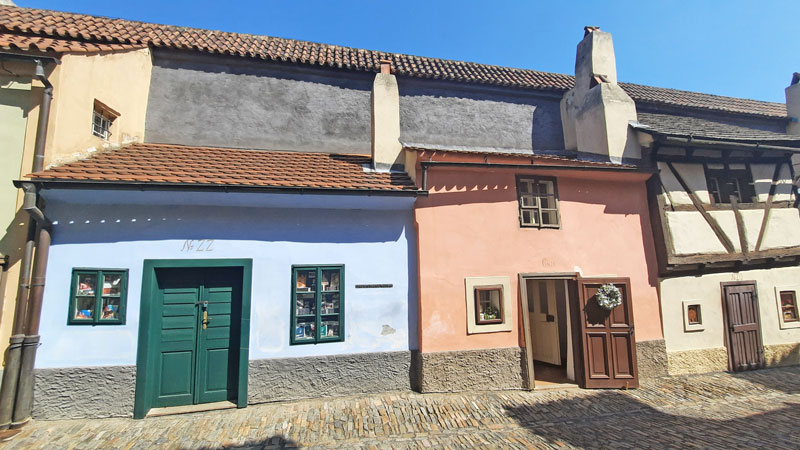
From 1916 to 1917, Czech writer Franz Kafka stayed occasionally at No.22 (it was actually his sister that lived here and Franz Kafka paid the rent). No.22 is the blue building on the left in the picture above
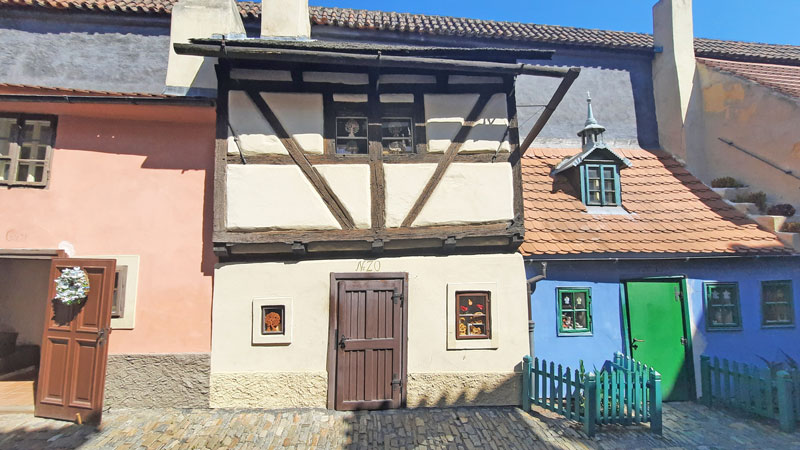
House No. 20 pictured above with a framed upper floor is an authentic example of a 16th Century Golden Lane house.
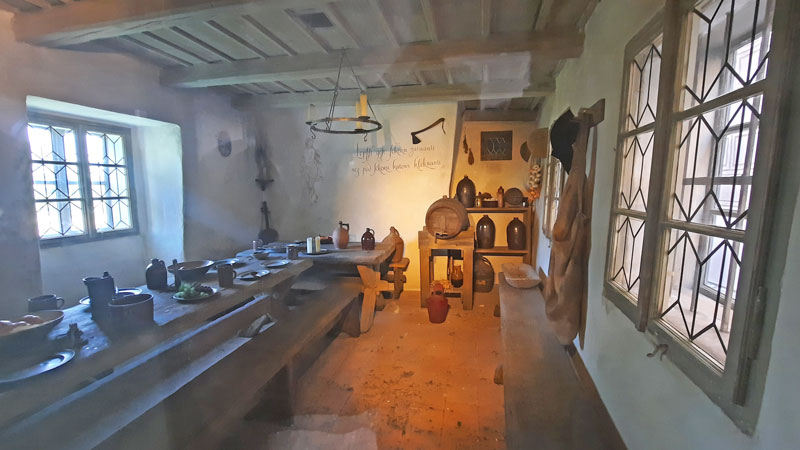
No.13 at the far end on the left (the pub) conforms to the original building specification in that the space had to be built entirely within an arch of the wall and only the entry door protrudes slightly into the lane. The picture above is of the restored interior. The writing on the wall roughly translates as “better to put the axe in the block than kneel under the axe of executioner”. In a 17th Century pub this would be seen as a warning of the fate that awaited anybody who took up arms against the Catholic king.
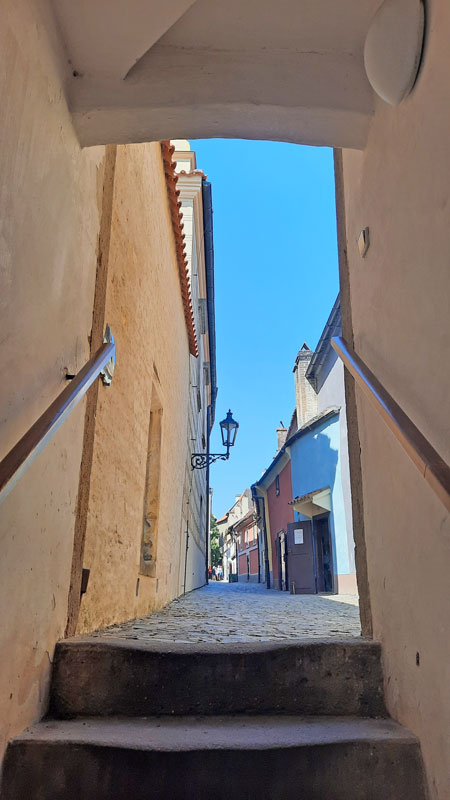
The staircase in house No.12 at the very far end of Golden Lane (pictured looking back down Golden Lane, No.13 is the door visible on the right) gives access to the terrace in front of the Daliborka Tower. This round cannon tower was part of the Jagiello fortification system with the bottom floor being used as a prison from the very beginning. In fact the name of the tower is taken from its best-known prisoner i.e. knight Dalibor of Kozojedy, who was imprisoned here in 1498. You should be able to walk down the steps and note, the skeleton is not real!.
Tickets and Entry
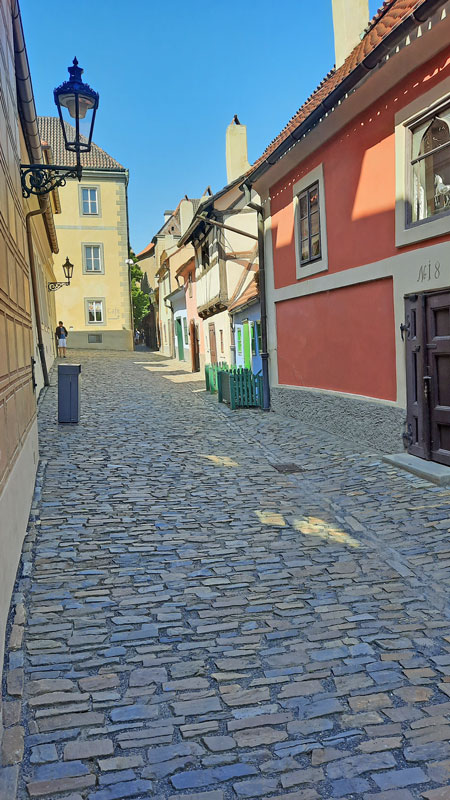
You cannot just pay to visit Golden Lane. If you want to visit then you’ll find that it is included in the venues covered by both the Prague Castle “Circuit A” and “Circuit B” ticket which are explained on the Prague Castle Tours page. During the summer you may find that after 6pm Golden Lane is accessible for free but all the historic houses will be closed.
Official website is at https://www.hrad.cz/en/prague-castle-for-visitors/
Someting Related or a Few Minutes Away
Attraction – ST Vitus Cathedral
Attraction – The Old Castle Steps
Activity – Prague Castle Tours
Food and Drink – ST Wenceslas Vineyard
